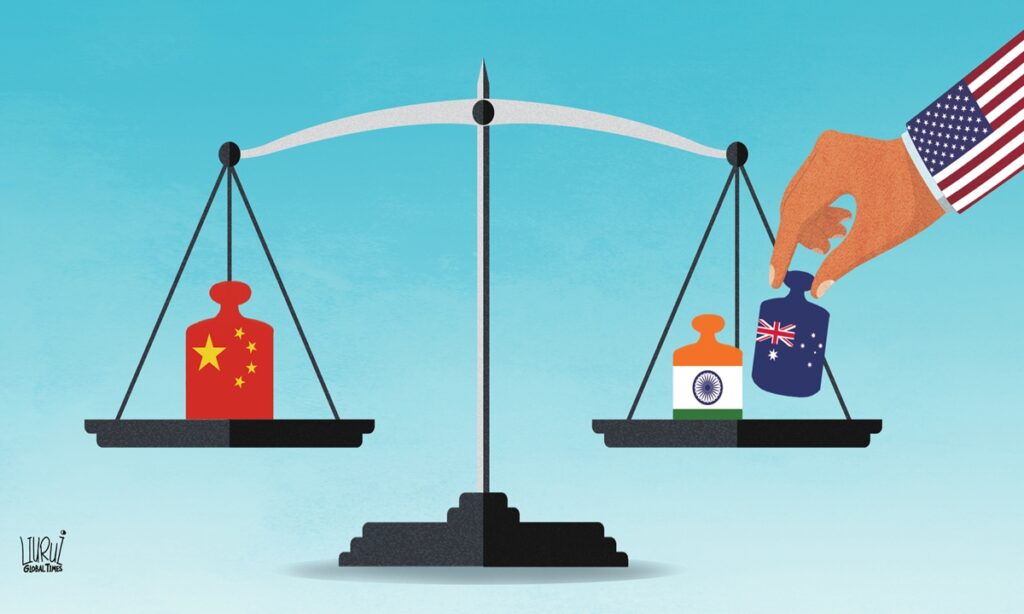Driven by changes in international and regional affairs, the “Quad” mechanism of the US, India, Japan, and Australia has attracted much attention from all parties, and has taken on new courses of actions.
Following the signing of the Australia-India Mutual Logistics Support Arrangement in June, New Delhi announced – as reported in the Indian press on July 13 – that it would invite Canberra to participate in 2020’s Malabar naval exercise in the Bay of Bengal.
If the plan is implemented, the military exercise will bring together India, the US, Japan and Australia for the first time under the full “Quad” squad. This cooperation at the military level will add new variables to the prospects of the security in the Indo-Pacific region.
In Washington’s plot, two trilateral mechanisms – the US-Japan-Australia alliance and the US-Japan-India coalitions – are now being integrated into one. The Malabar drills will see joint maritime cruising, improvement of the interoperability of weapon platforms and military equipment of all parties, and the construction of sensing system in the Indo-Pacific region. It will also strengthen regional missile defense, and will to great extent determine whether or not the Indo-Pacific Strategy will be successful.
Some US strategists even plan to build up an Asian version of NATO based on the “Quad” mechanism to counterbalance China, Russia, and North Korea.
Since the “Quad” mechanism was proposed, the US, India, Japan and Australia have continuously upgraded their consultation levels. Their first foreign ministerial meeting was held during the UN General Assembly in September 2019.
Analysts generally believe that the bilateral cooperation within the “Quad” is not balanced. Particularly, the relationship between India and Australia is relatively distant and weak compared to other pairs of bilateral relations. For India, it is mainly a question of strategic will; while for Australia, it is a matter of strategic capability.
In recent years, although under the continuous persuasion from the US, India has not agreed to let Australia formally join the Malabar exercise, which started in the 1990s with only joint US-India naval drills. In the beginning of the 21st century, the exercise expanded to include Japan as India adopted flexible policies while behaving carefully to avoid agitating China.
Currently as the China-US relations have deteriorated rapidly and strategic competition is becoming increasingly fierce between the two powers, the US has seized the opportunities of the downturn in China-India relations and the intensity of China-Australia ties to repeatedly court India and Australia, in order to make up for the weak points of the “Quad” mechanism.
This is why Washington is pulling them together to play a stronger role to contend with alleged “military and economic threats” from China.
The recent border clash between China and India has sharply increased India’s hostility toward China. New Delhi chooses to enhance its security cooperation with Canberra, invite the latter to participate in the joint military exercise, and promote the “Quad” mechanism into a substantial direction.
On one hand, by partly meeting the actual needs of the US over its Indo-Pacific Strategy, India can show its stance of distancing China and tilting toward the US. This leaves imaginary space for India and the US to continue to approach closer and even carry out more cooperation within the “Quad” mechanism.
On the other hand, India can exaggerate its real diplomatic leverage to show so-called clear and powerful signals to China, in an attempt to relieve pressure over the border issues. At home, India can also show its determination to fight back and punish China, so as to ease the political pressure from the anti-China forces in India.
India is a key actor in the “Quad” mechanism. How far India will go in the next step depends not only on whether China-India relations will cool down as soon as possible. It also hinges to a large degree on China-US tensions, US domestic politics, and India-Russia relations.
China-Australia relations have become icy since the COVID-19 outbreak. Based on its dishonorable role in Huawei, Hong Kong, and the South China Sea affairs, Australia needs more substantive “Quad.” This is in line with Aussie acting as a US vanguard to contain China and its demand to play a bigger role in the Indo-Pacific security affairs in the future.
The author is director of the research department of the National Strategy Institute at Tsinghua University in Beijing. opinion@globaltimes.com.cn
Illustration: Liu Rui/GT



